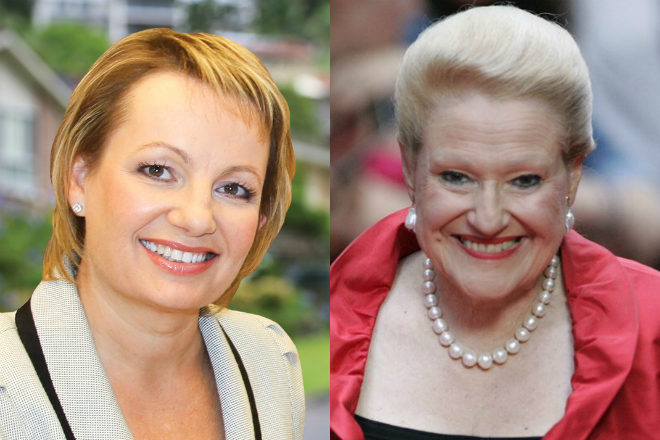Politicians Ripping Off The Public? It’s Not New, But It Matters More Than Ever
Each time we run through this, people like Pauline Hanson get more support.

Here’s a fact you might not know: whenever our politicians travel to Canberra to attend Parliament they are eligible to claim a $276 per night allowance, on top of their base salary of $200,000. Meanwhile, a single person on the Newstart allowance receives $264 per week.
Yep, federal politicians earn more from their travel allowance in one day than welfare recipients are expected to live on for an entire week.
The purpose of the travel allowance is to offset the accommodation cost politicians incur when they stay in Canberra. But here’s the deal: if politicians stay in a cheaper hotel or share rooms to reduce costs, they still pocket the full $276. Any money they save just goes into their bank account to top up their already generous salaries.
If that’s not infuriating enough, dozens of politicians actually own property in Canberra but they still claim the travel allowance to help pay off their mortgages.
The travel allowance isn’t restricted to Canberra either. Politicians can claim it whenever they travel for work. But that’s far from the end of it.
Politicians And Expense Scandals: A History
The health minister, Sussan Ley, has became the focus of the latest expenses scandal. It’s emerged that she claimed a travel allowance, and got the taxpayers to pay for her chauffeur for a trip to the Gold Coast where she ended up purchasing an $800,000 investment property.
It turns out that Ley, who lives in the NSW town of Albury, has charged the taxpayer for 20 trips to the Gold Coast over the past three years, including on New Year’s Eve. She’s now decided to pay back the cost of four of the trips, in response to public outrage, but claims that “It’s not an admission that [she’s] broken the rules.”
As outrageous as Ley’s expenditure is, she’s right. The rules around expenses are deliberately opaque and designed to give politicians as much wriggle room as possible. As long as some kind of work related event was attended, travel allowances can be claimed. The politician doesn’t even have to be transparent about the specific nature of the work event.
This isn’t the first time a politician has been accused of abusing the expenses system. Remember Choppergate? Joe Hockey’s “double dipping”? In all these instances the politician in question was earning at least $340,000 a year, but they still chose to claim as much money as they could through expenses.
Bronwyn Bishop attacks "socialists" and others behaving like a "pack of dogs" in going after Sussan Ley @SkyNewsAust
— Karen Barlow (@KJBar) January 9, 2017
This time the scandal has snowballed quickly. That’s partly due to the fact that the story emerged exactly when the government was being forced to defend its new (and utterly absurd) Centrelink debt recovery system that is slapping former welfare recipients with false debt notices and threatening them with jail.
It’s become clear that our politicians have no interest in seriously reforming the political system to stop this kind of abuse. Too many of them, on all sides, benefit from the status quo. But whenever these scandals emerge they’re a reminder that there’s a huge gap between public expectation and political behaviour.
That gap is getting bigger, and it’s starting to have a real political impact. The growing antipathy the public feels towards politicians — fuelled by these kinds of scandals — is part of the reason voters are turning away from the major parties in droves.
The Public Has Had Enough
At last year’s federal election minor parties and independents received the highest share of the vote since the two-party system stabilised after World War II. The most recent Australian Electoral Study, collated by the Australian National University every three years, showed that trust in politicians had plummeted to the lowest level ever recorded. Only 26 percent of Australians said they had confidence in the government.
Seventy-four percent said politicians were “too often interested in looking after themselves”. Given the frequency of these expenses scandals, is it any wonder why?
There are a number of reasons why the public is turning away from the major parties and looking to people like Nick Xenophon and Pauline Hanson for an alternative. Some of it has to do with policies. In the case of Xenophon, there’s no doubt his strong pro-South Australia message resonates in a state with the highest unemployment in the country.
Likewise, Hanson obviously draws support from voters hostile to migration, though it’s likely her economically protectionist policies and bashing of the banks help as well.
But as the Australian Electoral Study shows, the rise of ‘anti-politicians’ isn’t solely fuelled by policy considerations. There’s a broader malaise that’s infected politics. It might be less tangible, but it’s still very real. It’s the idea that politicians are purely there to serve themselves and their own interests.
I’ve got no love for the major parties, but the fact that their incompetence and greed is helping boost people like Pauline Hanson makes me very anxious.
It’s true that distrust of politicians and of our political system has always been there to an extent. But study after study, and election after election, is proving that it’s becoming more commonplace.
The Rise Of Populist Anti-Politicians
Between 2011 and 2013 the pay for federal politicians increased by 34 percent. The average pay rise across the rest of the population for the same period was 6 percent. The base salary of a federal politician is higher than 98 percent of the working population. Government ministers are in the top one percent of income earners.
Politicians, simply by virtue of their job and the wealth they accrue in it (aided by generous travel allowances) are disconnected from the rest of the population.
Let's get this straight? Make 37 trips to the GC on taxpayers $$, you're not breaking rules. If Centrelink overpays you, you can go to jail?
— Hamish Macdonald (@hamishNews) January 8, 2017
To see them top-up their salaries, already four times the median wage, by abusing the system is infuriating. Seeing them do it while they’re attempting to claw back money from welfare recipients leaves you speechless.
It’s going to take so much more than reform of the entitlements system to rebuild the public’s faith in politics, if that’s still possible (or even desirable). So far our politicians have shown that they aren’t really interested in doing even that, and they think they can just ride out the periodic waves of controversy. But the rise of populist politicians like Hanson and Xenophon should be shaking their complacency.
Our politicians should stop acting shocked by the rise of populist minor parties. They’re the reason it’s happening.

